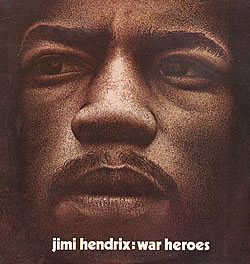| War Heroes | ||||
|---|---|---|---|---|
 | ||||
| Compilation album by | ||||
| Released | October 1972 | |||
| Recorded | April 1967 – July 1970 | |||
| Genre | Rock | |||
| Length | 35:20 | |||
| Label | Polydor (UK) Reprise (US) Barclay (France) | |||
| Producer | ||||
| Jimi Hendrix US chronology | ||||
| ||||
| Jimi Hendrix UK chronology | ||||
| ||||
War Heroes is a compilation album [1] by American guitarist Jimi Hendrix. Released in the UK in October 1972, and in December 1972 in the US, it was the third album of mostly unreleased studio recordings to be issued after Hendrix's death. The album was engineered, mixed and compiled by Eddie Kramer and John Jansen, although biographer and later Hendrix producer John McDermott also identifies Hendrix as a producer. [2]
Contents
War Heroes contains three songs that Hendrix proposed for his fourth studio album: "Stepping Stone", "Izabella", and "Beginnings" (listed as "Beginning"). These and songs from the two 1971 albums, The Cry of Love and Rainbow Bridge , were included on First Rays of the New Rising Sun (1997). War Heroes reached number 23 in the UK Albums Chart, number 48 on the US Billboard 200, [3] and number 51 in Canada. [4]